Ewout Irrgang, SP Development Spokesman, Visits Sudan
Ewout Irrgang, SP Development Spokesman, Visits Sudan
SP member of Parliament Ewout Irrgang was part of a working group of members of the Dutch Parliament's Committee on Foreign Affairs which visited Sudan from 5th to 12th July in order to see for themselves the political situation in the troubled country. He kept a diary of his visit, from which these excerpts are translated.
 Saturday 5th July
Saturday 5th July
Today I travelled with a number of other Members of Parliament to Sudan for an official visit to Khartoum, Darfur and South Sudan. We arrive in Khartoum, the country's capital, early in the evening. The city is famous for being the hottest national capital in the world, and when we landed the temperature outside was forty degrees. The ambassador and his staff are there to meet us, and we go not to our hotel but straight to a meeting with Ameerah Haq, acting special representative in Sudan of UN General Secretary Ban Ki Moon. She gives us an introductory talk on the situation in the country, after which we go to our hotel. A luxury hotel, but here in fundamentalist Sudan, one without alcohol.
Sunday 6th July
On this sort of trip, official visits are an obligatory item, whether you like it or not. In this case it was hardly a pleasant prospect, as the Sudanese regime is suspected of responsibility for a number of horrible war crimes in Darfur. A meeting with Osman Khaluid Mudawi, Chair of the Foreign Affairs Committee soon turns nasty as he insists that none of us has any real understanding of Darfur. At one point he even suggests that NGOs in Darfur are collecting soil samples and taking them abroad to search them for minerals. This is laughable, scandalous and insulting. A member of the centre-right opposition party the VVD joins me in making a firm statement about the truth regarding the war crimes of the Sudanese army. The next meeting, at the Ministry of Foreign Affairs, runs more smoothly as they are somewhat more diplomatic in expressing their views. After that we speak to Dr. Nafie Ali Nafie, the powerful assistant of Sudanese President Bashir. Once again an ugly meeting. These are hardliners who are not at all concerned about the outside world, and certainly not bothered by a Dutch delegation.
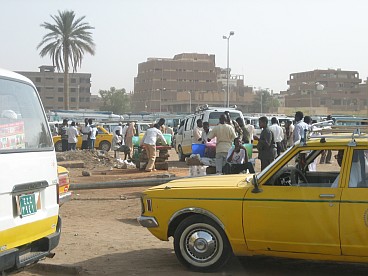
Next, a meeting with the World Bank that produces little of worth. At the beginning of the evening we speak to a number of NGOs who tell us about the problems in Darfur and South Sudan. Then, much against my better judgement, to a dinner out on the Nile at which we are the guests of the human rights activist Ibrahim Adam Mudawi.
Monday 7th July
We meet with a number of Sudanese NGOs at the hotel, after which we go to the headquarters of UNMIS, the UN force responsible for observing the maintenance of peace between North and South. Last month in the Abiyei province, where most of the country's oil is to be found, the situation got completely out of hand. Neither party seems to want to see a repeat of this, but things could easily go wrong again.
From there we go to a refugee camp near Khartoum. The thousands of refugees come mostly from the south. We aren't allowed to leave the cars, except to visit a community centre where, to take an example, young children are being weighed to see whether they need extra food. I give the centre a pack of notebooks, pens and also biscuits (cookies) that a friend had given me to pass on. It was 44 degrees in the shade and scarcely bearable. How can these people stand this, housed as they are in corrugated metal? It's hard to imagine such a life.
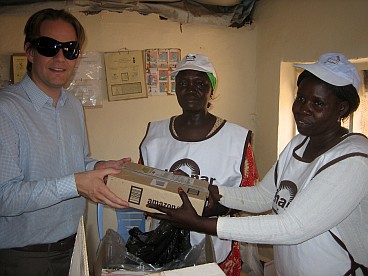
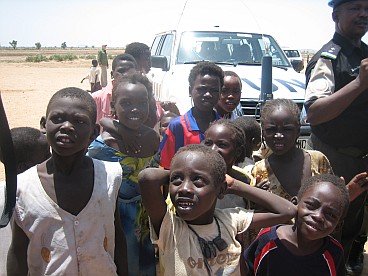
After a few hours we go to meet Hassan Al Turabi, one of the spiritual leaders of fundamentalist Sudan who has fallen into disfavour. He once brought Osama Bin Laden to Sudan but has also spent years in prison. You expected a certain type of person, but in his villa we find a friendly, even charismatic man of 76, with the energy of a 30-year-old. He talks the ears off our heads but seems far from 'radical' in his views. The Darfur rebels, he says, really do want to talk, despite what the government in Khartoum might say. Khartoum wants to talk too, he says, even with the JEM who until recently stood with their troops at the gates of Khartoum. He even suggests that Development Minster Bert Koenders has only to take the initiative for a new peace conference.
The programme continues and we have a further meeting at the headquarters of the SPLM, the political movement of the former rebels from the South. We speak with Pagan Amun, a member of the government of national unity. The SPLM now officially argues against the independence of South Sudan, but its supporters on the ground probably see things differently.
In the evening we dine with the Dutch community at the embassy and I speak with a number of Dutch members of UNMIS and other Dutch people working, for example, for the UN. Outside it was still 37 degrees, but at last I could drink a beer!
Tuesday 8th July
With the World Food Programme (WFP) plane to Nyala in Darfur. After lunch we go in convoy to the Kalma camp, which houses more than 100,000 refugees. This convoy has to be protected by the UN force UNAMID, because rebels and bandits are out to get our jeeps, which can only manage 25 kph on the unmetalled road. The refugees tell us that the UN doesn't do anything any longer to protect them after about four o'clock in the afternoon. The WFP has halved food rations because of the cost of security and the high price of the food itself, so that the refugees are suffering from hunger. You feel absolutely powerless and yet these people think that you are so powerful.
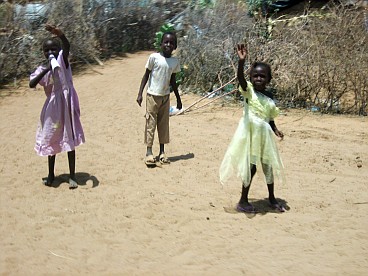
Wednesday 9th July
We leave in a small plain for El Fasher, Darfur's capital and after a short meeting with the Wali (Governor), an obvious scoundrel on whom we wasted little time, we make our way to the headquarters of UNAMID. This turns out to be a difficult meeting. Special Representative Adawa says first of all that neither the mandate nor the number of troops is the problem, but rather the logistics. Only with helicopters could he protect people, but nobody, no country, was providing them. Another UN official adds that people can only really be protected if there is peace.
I was coming increasingly to the conclusion that there was only one possible solution here, and that would be a political solution. The UN force UNAMID is, just as is the case with the food aid, no more than a bandage on a serious wound. The Netherlands must, with the EU, put more pressure on the Sudanese government, but also on the rebels, one of the most important of whom is based in Paris.
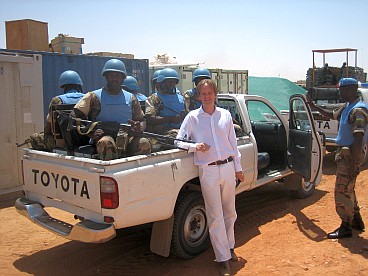
Three hours flight takes us to Juba, the capital of South Sudan, a town which has the only metalled road in the whole of the region. Uncertainty prevails over an 'incident' involving UNAMID in which seven people lost their lives and another involving UNMIS where one person was seriously wounded. This was, I feel, connected to the expected decision of the International Criminal Court to arraign more people over Darfur.
Thursday 10th July
In the morning we visit the Joint Donor Office and then a clinic, a water conservation installation under construction, and a hospital. The hospital smells awful but it is apparently much better than what they had before, which was almost nothing. In the last fifty-two years, South Sudan has seen thirty-eight years of war. Out of eight million inhabitants, two million have died and four million have been forced to flee.
In the afternoon we have an interesting meeting with the international NGOs who tell us that the multi Donor Trust Fund of the World Bank is much too bureaucratic and that the Basic Services Fund works much better, something I hear often. We also visit a radio station set up by the UN, and at the end of the afternoon we meet with the local opposition parties, almost all of which are pro-independence, which says something about the views of the local population. In the evening we dine with women Members of Parliament and refugees who have returned. Peace with the North is so fragile. Everyone says just the right thing when it comes to Darfur, but if this should ever go wrong again...
The ambassador talks to us about the tense situation following the attack on UNAMID. The UN has sent all of its staff's partners and children home, as a precaution.
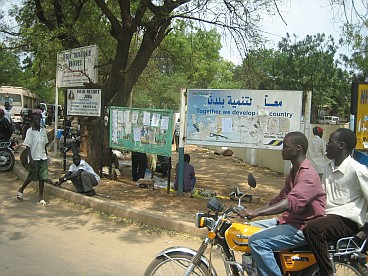
Friday 11th July
An emergency landing in Juba. Following heavy turbulence what probably happened was that ice has damaged the window of the cockpit, so that the pilot decided to make an emergency landing on a nearby airstrip. We will have to spend the night here.
In the morning we speak with three ministers in Juba, as well as with the vice-president of the parliament and two committee chairs. What strikes me most is that everyone assumes that independence will come in 2011 when a referendum on the matter will be held in the south. They don't trust the North and you can't blame them. They see the ICC as an ally rather than a threat to peace. They aren't afraid of the North, however, Many of the North's soldiers came from Darfur. In eastern Sudan too, there is now a rebel movement, so what these people reasoned was that they were divided. In the afternoon we visit UNMIS in Juba, and finally the World Bank, where I get little reaction to my criticism that they are too bureaucratic.
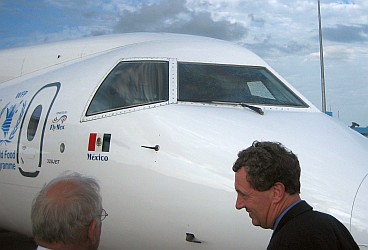

Saturday 12th July
Once again, yesterday afternoon, we were forced to make an emergency landing, this time in Malakal, between Juba and Khartoum. The security services quickly arranged UN cars and soldiers to provide protection and we proceeded to the UNMIS camp. The next day we fly back to Khartoum for our last meeting, with the Minister of Foreign Affairs, but unfortunately he has nothing to say about the situation surrounding Bashir.
Tomorrow we fly home. Insh'Allah
